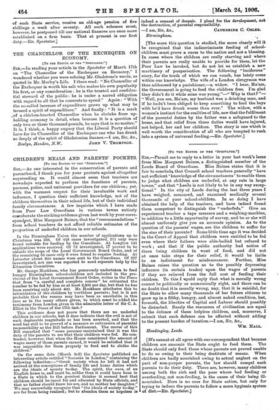CHILDREN'S MEALS AND PARENTS' POCKETS. [To THE EDITOR OP TIM
"SPECTATOR.1
SIR,—As one interested in the conservation of parents and parenthood, I thank you for your protests against altogether superseding us. It would almost seem that teachers are nowadays expected to perform the functions of parents, parsons, police, and universal providers for our children; yet, with the warmest respect for their invaluable work and influence, I question their sufficient knowledge, not of the children themselves in their school life, but of their individual family circumstances. A few inquiries which I have made from Poor Law Guardians in various towns entirely corroborate the striking evidence given last week by your corre- spondfnt, Miss Margaret Baines, that the " recommendations " from school teachers do not afford reliable estimates of the proportion of underfed children in our schools.
In the Birmingham Union the number of applications up to Christmas was 566. Of 443 cases investigated, 211 only were found suitable for feeding by the Guardians. At Longton 141 applications were received. Of '72 investigated, 17 proved to be outside the scope of the Local Government Board Order, and of the remaining 55 cases only 6 were found to require feeding. At Leicester about 900 names were sent to the Guardians. Of 227 investigated, not one was reported to need separate help by the Education Committee.
Mr. George Hookham, who has generously undertaken to feed hungry Birmingham school-children not included in the pro- visions of the Local Government Board Order, writes in the Times that from "a careful and complete census" he estimated the number to be fed by him as at least 2,500 per day, but that he has been receiving only about 400. Mr. Hookham attributes this to intimidation of the children by worthless parents ; but is it not probable that the census may have been as unreliable in this case as in the many others given, to which must be added the testimony from London given in the admirable letter of Sir C. A. Elliot in the Times of the 17th inst.
This evidence does not prove that there are no underfed children in our schools, but it does indicate that the evil is not of such deplorable magnitude as has been asserted, and that the need has still to be proved of a measure so subversive of parental responsibility as the Bill before Parliament. The mover of this Bill remarked that " some persons. maintained that it was the duty of the parents to see that their children were fed. He con- tended, however, that when the House considered the amount of wages many of those parents earned, it would be satisfied that it was impossible for them properly to feed and to clothe the children."
On the same date (March 3rd) the Spectator published an interesting article entitled " Socrates in London," containing the
following reflection Greek society when he left it had not arrived at the conceptions of family life and home duties which are the ideals of society to-day. The spirit, the aura, of an English home is, and must be, nobler than it could have been in a State in which to the greatest thinker it seemed best that children should be cared for and educated by State officials, and that no father should know his son, and no mother her daughter." We may sorrowfully recognise that "the ideals of society to-day" are far from being realised; but to abandon them as hopeless is indeed a counsel of despair. I plead for the development, not the destruction, of parental responsibility.
Birmingham. • .
[The more this question is studied, the more clearly will it be recognised that the indiscriminate feeding of school- children must prove a curse to the nation and not a, blessing. In cases where the children are really starving and where their parents are really unable to provide for them, let the Poor Law be invoked, but do not let us establish a new machinery of pauperisation. The following "luciferous" story, for the truth of which we can vouch, has lately come within our knowledge. The wife of a London clergyman was thus addressed by a parishioner,—a widow. "I hear, Ma'am, the Government is going to feed the children free. rm glad they didn't do it while mine was young."—" Why is that P "— " Well, you see, Ma'am, my husband was a drinking man, and if he hadn't been obliged to keep something to feed the boys with he'd have drunk worse than ever." The widow, with a woman's instinct for the realities of life, saw that the fulfilment of the parental duties by the father was a safeguard to the home, and that relief from those duties would have injured, not helped, her and her children. The story is one which is well worth the consideration of all who are tempted to rush into a system of universal feeding.—En. Spectator.]










































 Previous page
Previous page